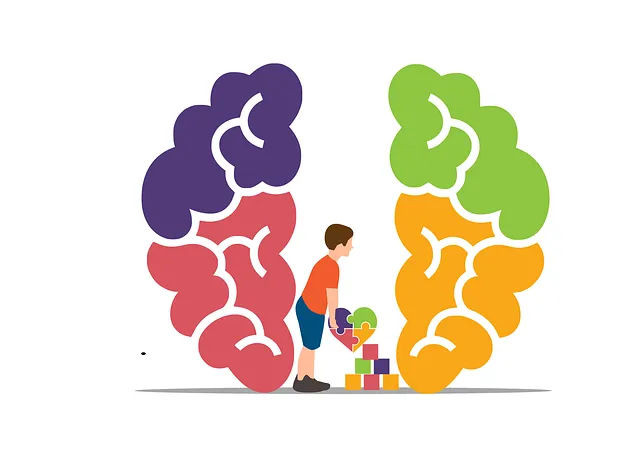Arvada Kaiser mental health classes offer a holistic, empowering approach to mood regulation and emotional well-being. Through education, skill-building, cognitive techniques, lifestyle adjustments, and mindfulness practices, participants gain tools to manage stress, anxiety, and trauma while cultivating inner peace and resilience. The program's focus on emotional intelligence, conflict resolution, and cultural competency equips individuals to navigate life's challenges with greater ease and balance.
In our fast-paced world, maintaining emotional balance is crucial. This article explores effective mood regulation strategies for a holistic approach to well-being. From understanding the basics of mood control to practical techniques like cognitive retraining and mindfulness, we provide a comprehensive guide. Discover the Arvada Kaiser Approach, unique mental health classes designed to empower individuals with powerful tools for managing moods. Learn lifestyle adjustments that nourish both body and mind, ensuring long-term emotional stability.
- Understanding Mood Regulation: Unlocking Emotional Balance
- The Arvada Kaiser Approach: Mental Health Classes for Effective Strategies
- Cognitive Techniques: Retraining Your Mind for Better Mood Management
- Lifestyle Adjustments: Nourishing Your Body and Mind for Stability
- Mindfulness and Relaxation: Calming Tools for Instant Mood Enhancement
Understanding Mood Regulation: Unlocking Emotional Balance

Understanding Mood Regulation is a pivotal step in achieving emotional balance and overall well-being. At Arvada Kaiser Mental Health Classes, we delve into various strategies to help individuals navigate their emotions effectively. These techniques are designed to equip folks with tools to manage stress, anxiety, and even trauma (Trauma Support Services), fostering a sense of control over their mental state. By exploring different approaches, whether it’s through Social Skills Training or implementing Stress Reduction Methods, our classes empower participants to unlock their emotional potential.
Through a holistic approach, we guide students to recognize triggers, identify healthy coping mechanisms, and develop resilience. This process allows them to transform challenging situations into opportunities for growth and self-discovery. By integrating these practices into daily life, individuals can enhance their ability to stay grounded, improve relationships, and cultivate a deeper sense of inner peace.
The Arvada Kaiser Approach: Mental Health Classes for Effective Strategies

The Arvada Kaiser Approach to mood regulation focuses on empowering individuals through education and skill-building. Their mental health classes are designed to teach effective strategies for managing emotions, fostering inner strength development, and enhancing emotional intelligence. Participants learn valuable tools such as conflict resolution techniques, enabling them to navigate challenging situations with greater ease.
These classes create a supportive environment where individuals can explore their emotional landscapes, gain insights into their triggers, and discover personalized coping mechanisms. By combining theoretical knowledge with practical exercises, the Arvada Kaiser program equips attendees with the skills needed to proactively regulate their moods, improve overall well-being, and enhance their ability to handle life’s stressors.
Cognitive Techniques: Retraining Your Mind for Better Mood Management

Cognitive techniques offer powerful tools for retraining your mind and enhancing mood regulation. These strategies, often taught in Arvada Kaiser mental health classes, focus on challenging negative thought patterns and replacing them with more positive and realistic perspectives. By learning to identify cognitive distortions, individuals can gain a deeper understanding of their emotions and break free from unhelpful cycles.
The process involves developing empathy for oneself and others, which is a key component in many successful mood management programs. Public awareness campaigns and mental illness stigma reduction efforts have played a significant role in promoting the importance of such strategies, encouraging people to seek support and fostering a more supportive environment for those dealing with emotional challenges.
Lifestyle Adjustments: Nourishing Your Body and Mind for Stability

Maintaining a stable mood isn’t just about managing emotions; it’s deeply connected to how we care for our bodies and minds. At Arvada Kaiser mental health classes, participants learn powerful tools for cultivating inner stability through lifestyle adjustments. This involves embracing a balanced diet rich in nutrients that support brain health, ensuring adequate sleep to restore the mind and body, and incorporating regular physical activity to release endorphins and reduce stress.
Additionally, these classes emphasize the importance of cultural competency training for healthcare providers, promoting understanding and empathy towards diverse perspectives on mental well-being. By integrating burnout prevention strategies into daily routines, individuals can build resilience against life’s challenges. This holistic approach, combined with effective resilience building techniques, equips individuals to navigate stress, anxiety, and mood fluctuations with greater ease.
Mindfulness and Relaxation: Calming Tools for Instant Mood Enhancement

Mindfulness and relaxation techniques are powerful tools for anyone looking to enhance their mood regulation skills. These practices have gained significant attention in recent years, thanks in part to the popularity of Arvada Kaiser mental health classes, which emphasize the benefits of mindfulness for improving overall well-being. By focusing on the present moment and cultivating a non-judgmental awareness of one’s thoughts and feelings, individuals can experience an immediate sense of calm. Simple breathing exercises, guided visualizations, and progressive muscle relaxation are just a few techniques that can help lower stress levels and improve mood instantly.
In times of crisis or heightened anxiety, these calming strategies become even more valuable. The Crisis Intervention Guidance offered by mental health professionals often incorporates mindfulness as a core component to help individuals manage intense emotions. Additionally, for healthcare providers facing high-pressure situations and potential burnout, incorporating relaxation techniques into their daily routines can be life-saving. Burnout prevention strategies that include mindfulness and relaxation not only improve emotional resilience but also enhance the ability to provide quality care to patients.
Mood regulation is a multifaceted process that involves understanding and managing our emotions effectively. By combining evidence-based strategies from cognitive techniques, lifestyle adjustments, mindfulness, and relaxation practices, individuals can achieve emotional balance and improve overall well-being. The Arvada Kaiser approach, offering mental health classes, provides a comprehensive framework for learning these valuable skills. Integrating these strategies into daily life enables folks to navigate mood fluctuations with resilience, fostering stability and enhancing their quality of life.




